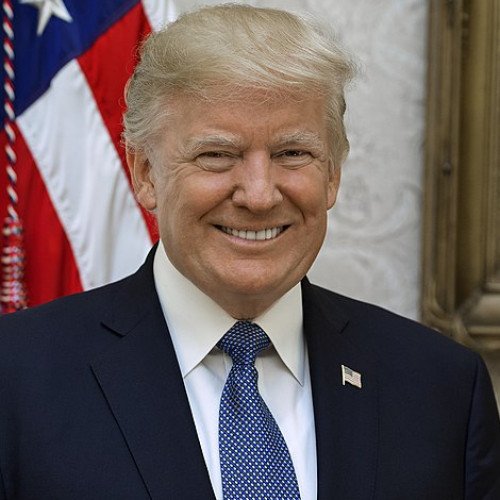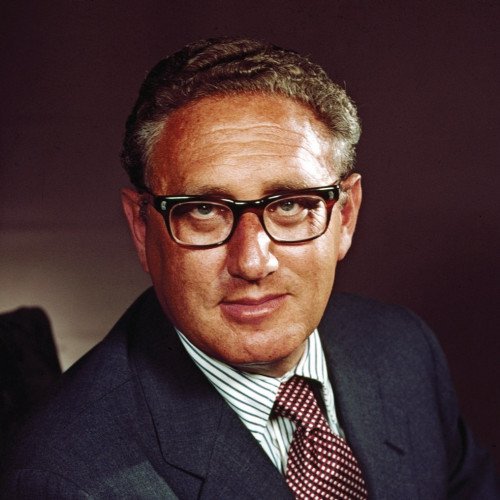Donald Trump VS Henry Kissinger

Donald Trump
Donald John Trump (born June 14, 1946) is an American politician who was the 45th president of the United States from 2017 to 2021. Before entering politics, he was a businessman and television personality. Born and raised in Queens, New York City, Trump attended Fordham University for two years and received a bachelor's degree in economics from the Wharton School of the University of Pennsylvania. He became the president of his father Fred Trump's real estate business in 1971, which he renamed The Trump Organization; he expanded the company's operations to building and renovating skyscrapers, hotels, casinos, and golf courses. Trump later started various side ventures, mostly by licensing his name. Trump and his businesses have been involved in more than 4,000 state and federal legal actions, including six bankruptcies. He owned the Miss Universe brand of beauty pageants from 1996 to 2015, and produced and hosted the reality television series The Apprentice from 2004 to 2015. Trump's political positions have been described as populist, protectionist, isolationist and nationalist. He entered the 2016 presidential race as a Republican and was elected in an upset victory over Democratic nominee Hillary Clinton while losing the popular vote. He became the first U.S. president without prior military or government service. His election and policies have sparked numerous protests. Trump made many false and misleading statements during his campaigns and presidency, to a degree unprecedented in American politics. Many of his comments and actions have been characterized as racially charged or racist. During his presidency, Trump ordered a travel ban on citizens from several Muslim-majority countries, citing security concerns; after legal challenges, the Supreme Court upheld the policy's third revision. He enacted a tax-cut package for individuals and businesses, rescinding the individual health insurance mandate penalty of the Affordable Care Act (ACA). He appointed Neil Gorsuch, Brett Kavanaugh and Amy Coney Barrett to the Supreme Court. He reacted slowly to the COVID-19 pandemic, downplayed the threat, ignored or contradicted many recommendations from health officials, and promoted false information about unproven treatments and the availability of testing. In foreign policy, Trump pursued an America First agenda: he renegotiated the North American Free Trade Agreement (NAFTA) as the United States–Mexico–Canada Agreement (USMCA) and withdrew the U.S. from the Trans-Pacific Partnership trade negotiations, the Paris Agreement on climate change and the Iran nuclear deal. He imposed import tariffs which triggered a trade war with China, moved the U.S. embassy in Israel to Jerusalem and withdrew U.S. troops from northern Syria. He met three times with North Korean leader Kim Jong-un, but negotiations on denuclearization eventually broke down. A special counsel investigation led by Robert Mueller found that Trump and his campaign benefited from Russian interference in the 2016 presidential election, but did not find sufficient evidence to press charges of criminal conspiracy or coordination with Russia. Mueller also investigated Trump for obstruction of justice and his report neither indicted nor exonerated Trump on that offense. Trump later pardoned five people who were convicted as a result of the Russia investigation. After Trump solicited Ukraine to investigate his political rival Joe Biden, the House of Representatives impeached him in December 2019 for abuse of power and obstruction of Congress. The Senate, after refusing to hear witness testimony, acquitted him of both charges in February 2020. Trump lost the 2020 presidential election to Biden but refused to concede defeat. He attempted to overturn the results by making false claims of electoral fraud, pressuring government officials, mounting dozens of unsuccessful legal challenges and obstructing the presidential transition. Hours before the ceremonial counting of the electoral votes on January 6, 2021, Trump rallied his supporters and exhorted them to march to the Capitol, which they then stormed. Five deaths resulted, and Congress was evacuated. Seven days later, the House of Representatives impeached him again, for "incitement of insurrection", making him the only American federal officeholder to be impeached twice.
Statistics for this Xoptio

Henry Kissinger
Henry Alfred Kissinger (; German: [ˈkɪsɪŋɐ]; born Heinz Alfred Kissinger; May 27, 1923) is an American politician, diplomat, and geopolitical consultant who served as United States Secretary of State and National Security Advisor under the presidential administrations of Richard Nixon and Gerald Ford. A Jewish refugee who fled Nazi Germany with his family in 1938, he became National Security Advisor in 1969 and U.S. Secretary of State in 1973. For his actions negotiating a ceasefire in Vietnam, Kissinger received the 1973 Nobel Peace Prize under controversial circumstances, with two members of the committee resigning in protest.A practitioner of Realpolitik, Kissinger played a prominent role in United States foreign policy between 1969 and 1977. During this period, he pioneered the policy of détente with the Soviet Union, orchestrated the opening of relations with China, engaged in what became known as shuttle diplomacy in the Middle East to end the Yom Kippur War, and negotiated the Paris Peace Accords, ending American involvement in the Vietnam War. Kissinger has also been associated with such controversial policies as U.S. involvement in the 1973 Chilean military coup, a "green light" to Argentina's military junta for their Dirty War, and U.S. support for Pakistan during the Bangladesh War despite the genocide being perpetrated by his allies. After leaving government, he formed Kissinger Associates, an international geopolitical consulting firm. Kissinger has written over a dozen books on diplomatic history and international relations. Kissinger remains a controversial and polarizing figure in U.S. politics, both condemned as an alleged war criminal by many journalists, political activists, and human rights lawyers, and venerated as a highly effective U.S. Secretary of State by many prominent international relations scholars.